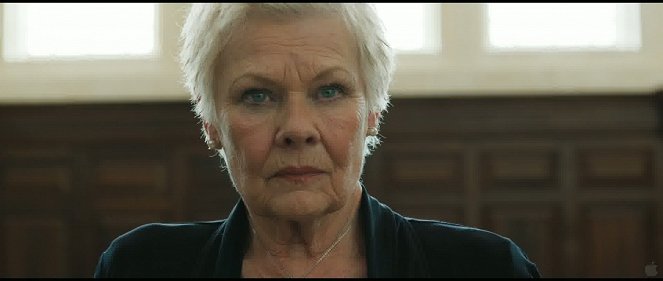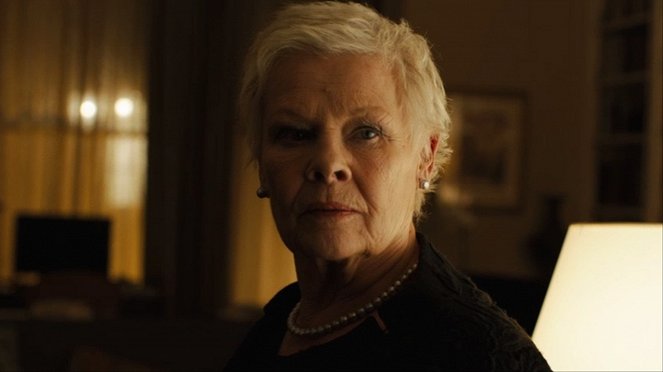Ohjaus:
Sam MendesKuvaus:
Roger DeakinsSävellys:
Thomas NewmanNäyttelijät:
Daniel Craig, Judi Dench, Ralph Fiennes, Javier Bardem, Naomie Harris, Bérénice Marlohe, Ben Whishaw, Helen McCrory, Albert Finney, Rory Kinnear (lisää)Suoratoistopalvelut (2)
Juonikuvaukset(1)
Kun M:n menneisyydestä paljastuu salaisuuksia, joutuu James Bondin uskollisuus joutuu koetukselle. Samaan aikaan superrikollisella Raoul Silvalla on maailmanvalloitus mielessään. (MTV3)
Videot (39)
Arvostelut (20)
The first half of Skyfall, the only highlight of which is the Shanghai skyscraper, is well crafted but lengthy. Following the obligatory Bond traditions, the pace of the story is slowed down by unnecessary characters (the Bond girl) and brings few surprises (Bond being equipped with technological toys). However, from the scene with a sailboat approaching the island – and the villain’s entrance – it is the best Bond movie until today. Paradoxically, it doesn’t really look like a Bond movie at all. Too bad that the directors of subsequent instalments won’t be able to follow in Mendes’s footsteps. The editing art in the scene involving the imminent court attack and the visual aesthetics in Scotland elevate the Bond brand to the level of a delicate film drama. It is also the first Bond movie in which I enjoyed the relationships between the characters. Javier Bardem, whose performance is somewhere between the Joker and Hannibal, should get an Oscar nomination for Best Supporting Actor.
()
I’ve always thought that Bond was a great guy who simply kills everybody and escapes even an earthquake epicenter in the blink of an eye, all while living in an absolutely unrealistic environment governed by the British MI5. That’s how it always used to be before Daniel Craig came along and added realness to the Bond toughness; realness that I’ve always missed. For example, Casino Royale is already perfect, I consider it to be the best Bond movie. The subsequent Quantum of Solace was a yawnfest and it was necessary for the authors to step up and film something… something simply unforgettable that would bring a bit of elegance into the saga. Skyfall is a not-so-realistic realistic not-so-Bond Bond movie. Bond isn’t such a champ as we know him anymore and at times, we even get worried about him. But there are still scenes that haven’t even as much as brushed up against the reality of the modern day. But even so, it’s still great fun. There’s loads of action. And even if it’s just decent, it’s still entertaining. Sam Mendes is an amazing director and you simply can’t take that away from him. The story isn’t that bad either and at last, a contemporary Bond returns to the past. But without a doubt, the best thing about the entire movie was Javier Bardem. I’ve only seen a villain this great in Batman, back when Joker appeared in the new series. And back then, I thought that such a villain could never be topped. But partly, the rating is actually this high because of him. It’d be boring without him. And don’t even get me started on the ending. The third Daniel Craig movie is just very well done. It’s not such a shocker anymore like Casino Royale was, but it’s still a really pleasant entertainment that attempts to be realistic, but it’s still just for fun. But Bond will never be any other way, so who cares?
()
I’m very lukewarm towards Bond films (“it’s just Bond”), but the hero of Skyfall is not James Bond, it’s Sam Mendes. Skyfall is perfect craftsmanship, no more than that. Skyfall is such perfect craftsmanship that I can’t avoid being enthusiastic about it. I truly enjoyed the climax in the foggy Scottish Highlands. A brilliant Barden.
()
As an uncritical admirer of QoS, I am quite amazed at how many people there are who are able to bitch about Bond ceasing to be Bond and fading out of the franchise. Yet Sam Mendes has made the most classic entry in the saga, one that fits perfectly into the Sean Connery era in particular, while still being able to work within the confines of the new century. In the opening action, the excavator seems to symbolically break the trend of the previous two films, so that the protagonist then sets out on a new adventure through the path of presumed death. It serves up all the old-school proprieties, starting with a creepy villain that Bardem relishes to no end (the dental exposition will keep me waking from sleep for a long time) while still managing to make fun of them (the conversation with Q) and still managing to get deeper into Bond's head than last time. Everything then culminates in a purely personal final battle, which styles itself as a personal apocalypse (not only because of the helicopter raid). If anything deserves extreme praise, it's Deakins' cinematography and the lighting work (the Shanghai episode rules!), which is crowned by Newman's music, taking a novel route in the style of John Powell. Craig, as usual, is on point. If I have anything to criticize the film for, it is perhaps the persistent effort to remind us that it is "old-school." However, a second screening will certainly fix that. [And it did. A film perfect in every detail. Watching it is pure ecstasy.]
()
This review is licensed to SPOIL. “Were you expecting an exploding pen?” Whereas Bond learned to use his memory in Quantum of Solace, now he uses his memories to delve much deeper into his own inner self (which the filmmakers subsequently use to delve deeper into MI6). His journey back to himself typically begins with a descent into the depths (the title sequence from the great beyond) and the subsequent retreat into the darkness (the action scenes contain frequently suspicious falling). Most of the film takes place underground and/or at night, like in one of the good old noir flicks that Mendes quotes from a few times (The Lady from Shanghai, The Third Man). The whole opening action sequence recalls earlier times, serving together with the following minutes as a final farewell to the straightforwardly action-oriented approach that was a guarantee of guilty-pleasure entertainment. That is surely no coincidence, because thanks to its atypical length, excellent gradation and the number of vehicle replacements, the prologue could easily serve as the film’s final attraction. The circular dramaturgy, with the beginning functioning as the end and the end functioning as the beginning, comes to fruition in the final act, which is surprising due to its static nature compared to the extremely dynamic start. ___ The defensive character of the final action sequence has its justification in the next task that Bond is confronted with – he must literally defend his old-fashioned methods against geeks, bureaucrats and the white-haired devil, who wickedly attacks one of the guarantees of the agent’s immortality, namely his manhood, which is thematised throughout the film. The astonishingly subversive (to the heterosexual majority) torture scene lasts an unusually long time compared to previous such scenes, and the homosexual innuendos in it are delivered comprehensibly enough to elicit defensive laughter from cinema-goers. As is customary for ambitious blockbusters, Silva has questionable motivations and it is very difficult to capture the evil of his jellyfish-like character (jellyfish-like shapes can be seen not only in the title sequence, but also during the shadow-play action set in Shanghai) and, at the same time, he is a complete antithesis to the positive protagonist (though he dresses in white, while Bond wears a black suit). He shares a notional mother with the orphaned Bond, and whereas Silva is in the role of the rejected son, James is the prodigal son. Though the name (M) remains the same, the mother is replaced by the father, from whom the fatherland is derived, which explains the greater emphasis on the “Englishness” of the film (the row of coffins draped with British flags, Turner’s painting, the Tennyson quote, the proud shots of London) and in which Bond finds the meaning of his other activities – in service to his country. The archetypal conflict between Cain and Abel is thus added to the motif of the Odyssean journey. The more daring among us could interpret the film as a family melodrama – it is probably the first Bond movie in which we see 007 not only with a bottle of beer, but also with a tear in his eye. As in the previous films, the women are melodramatically presented as victims, though they are no longer entirely passive. ___ Skyfall is rich in meaning not only in psychoanalytical terms (MI6 as the superego, Silva as the dark subconscious and Bond serving as the ego between them), as specialists in cultural studies can surely also find something for themselves in it (this time, the exotic landscapes are replaced by a symbol of modern China and the former colony). Mainly, however, Skyfall is an intelligent psychological-spy thriller. With captivating establishing shots to set the mood, clearly executed action scenes (a pleasant change after Marc Forster’s orgies of editing), non-black-and-white characters and a powerful soundtrack (though it’s a shame about the uneconomical use of John Barry’s musical motif), delightfully unobtrusive allusions to previous Bond films and some other celebrated works of cinema (Bond’s arrival in futuristic Hong Kong is reminiscent of the long car ride in Tarkovsky’s Solaris; the drive to Skyfall is filmed like the prologue to The Shining). The shots between action and reaction, when Bond is only just discovering new locations, best represent the filmmakers’ attempt to bring the agent closer to the real world. The opening shot is repeated multiple times; when we enter uncharted territory with Bond with the camera behind his back, a new world literally opens up before us (and Bond). It can be assumed that 007 will even more openly address the problems of today’s world in subsequent films, after he has dealt with his own private traumas. 90%
()
(vähemmän)
(lisää)



Mainos